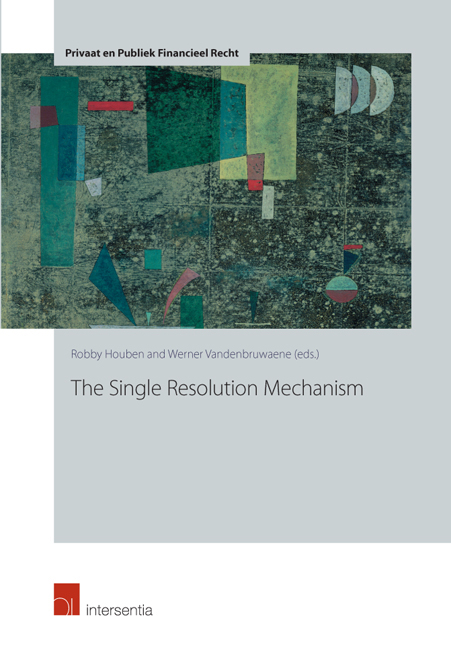Book contents
- Frontmatter
- Preface
- Contents
- Introduction: Recovery and Resolution, Future Solutions for Dealing with Insolvency
- The Single Resolution Mechanism. Institutional and Financing Arrangements for Bank Resolution in the European Banking Union
- Resolution from the Belgian Resolution Authority's Perspective
- Judicial Protection in the Single Resolution Mechanism
- The Rules on State Aid and the Framework for Bank Resolution: Foreplay and Interplay
- Concluding Remarks on Resolution and Resolvability Challenges
Introduction: Recovery and Resolution, Future Solutions for Dealing with Insolvency
Published online by Cambridge University Press: 25 September 2018
- Frontmatter
- Preface
- Contents
- Introduction: Recovery and Resolution, Future Solutions for Dealing with Insolvency
- The Single Resolution Mechanism. Institutional and Financing Arrangements for Bank Resolution in the European Banking Union
- Resolution from the Belgian Resolution Authority's Perspective
- Judicial Protection in the Single Resolution Mechanism
- The Rules on State Aid and the Framework for Bank Resolution: Foreplay and Interplay
- Concluding Remarks on Resolution and Resolvability Challenges
Summary
With the recovery and resolution framework, the European legislature has laid the foundation for the Banking Union's second chapter; only an EU deposit guarantee regime is missing, according to the original Banking Union plan. However, this does not mean that the work is over. The Commission has recently published a “Reflection paper on the Deepening the Economic and Monetary Union”, in which several issues that touch directly on the present subject are discussed.
Recovery and resolution are particularly important building blocks in banking regulation, given that they relates to the – oft en dramatic – finale of a bank's existence. This touches on the topic of the fundamentals of the bank supervisory system, which ultimately serves financial stability and the protection of investors and depositors, something which is very well illustrated in the contribution to this book. However, this matter not only relates to the final stage of a bank's existence, but it also reverberates throughout its ongoing existence, building confidence in the bank, allowing for more favorable conditions in the markets and securing the trust of depositors and creditors. At the macro level, a solid and credible recovery and resolution system supports a given state's entire financial system and, in that sense, supports the fundamental values of our democratic societies. The counterfactual can be illustrated by examining a major unorganised collapse's devastating effectsised: a run on the bank, more unfavorable ratings, turmoil in the markets, higher interest rates and flashing crisis indicators more generally.
Numerous factors contribute to building confidence in a financial system; one of the most important instruments to secure is that the financial institutions are well capitalised, well-managed, and that if an accident does occur, that the damages will be contained. These objectives raise multiple questions: should one give priority to the protection of particular parties over other; namely, creditors, employees, bondholders, taxpayers, etc.? Should the firm, as such, be protected, or should its stakeholders be protected instead? What is the responsibility of society, of its oversight bodies more specifically, in a financial institution's failure and who will have to pick up the pieces? Many other issues are now being raised when looking at recovery and resolution: which institutions have to be protected; just the largest ones?
- Type
- Chapter
- Information
- The Single Resolution Mechanism , pp. 1 - 6Publisher: IntersentiaPrint publication year: 2017

